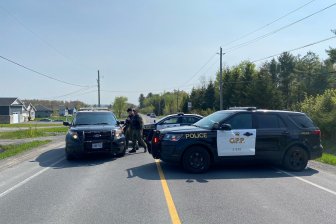Ukrainian President Volodymyr Zelenskyy says his country’s military needs more time to prepare an anticipated counteroffensive aimed at pushing back Russian occupying forces and opening a new chapter in the war more than 14 months after the Kremlin’s full-scale invasion.
Zelenskyy said in an interview broadcast Thursday by the BBC that it would be “unacceptable” to launch the assault now because too many lives would be lost.
“With (what we have) we can go forward and be successful,” Zelenskyy said in the interview, according to the BBC.
“But we’d lose a lot of people. I think that’s unacceptable,” he was quoted as saying. The interview was reportedly carried out in Kyiv with public service broadcasters who are members of Eurovision News, including the BBC.
“So we need to wait. We still need a bit more time,” Zelenskyy was quoted as saying.

A Ukrainian fightback against Russia’s invasion has been expected for weeks. Ukraine is receiving advanced Western weapons, including tanks and air defenses, and Western training for its troops as it gears up for an expected assault.
While a counterpunch is possible as the weather in Ukraine improves, there has been no word on when it might happen. Zelenskyy’s remarks could be a red herring to keep the Russians guessing, and ammunition supply difficulties faced by both sides have added more uncertainty.
A claim by the Ukrainian military on Wednesday that it had advanced up to two kilometers (1.2 miles) around the hotly contested eastern city of Bakhmut brought speculation that the counteroffensive was already underway.
But Serhii Cherevatyi, spokesman for Ukraine’s Operational Command East, told The Associated Press that the attack was not the “grand counteroffensive, but it’s a harbinger showing that there will be more such attacks in the future.”

The Kremlin’s forces are deeply entrenched in eastern areas of Ukraine with layered defensive lines reportedly up to 20 kilometers (12 miles) deep. Kyiv’s counteroffensive would likely face minefields, anti-tank ditches and other obstacles.
Russia is “acting slow” in Ukraine because it wants to preserve infrastructure and save lives there, Kremlin spokesman Dmitry Peskov claimed in an interview with the Bosnian Serb channel ATV broadcast Wednesday night.
Moscow has repeatedly explained its lack of advances on the battlefield as an effort to protect civilians, but those claims have been proven false.
Zelenskyy said Russian President Vladimir Putin is counting on reducing the war to a so-called frozen conflict, with neither side able to dislodge the other, according to the BBC. He ruled out surrendering territory to Russia in return for a peace deal.
Military analysts have warned that Putin is hoping that the West’s costly support for Kyiv will begin to fray.
Ukraine’s Western allies have sent the country 65 billion euros (US$70 billion) in military aid to help thwart the Kremlin’s ambitions, and with no peace negotiations on the horizon the alliance is gearing up to send more.

European Union Foreign policy chief Josep Borrell said the possible need to delay a counteroffensive was a sign that the West must step up its military support for Ukraine.
“Certainly, they need more preparation,” Borrell said at a defense and security conference in Brussels. “They need more arms. They need to gather more capacity, and it is us who have to provide for that.”
A senior NATO official said that in the coming months of the war, Ukraine will have the edge in quality but Russia has the upper hand in quantity.
“The Russians are now starting to use very old materiel, very old capabilities,” Adm. Bob Bauer, chair of the NATO Military Committee, told reporters late Wednesday in Brussels.
“The Russians will have to focus on quantity,” he said. “Larger number of conscripts and mobilized people. Not well-trained. Older materiel, but large numbers, and not as precise, not as good as the newer ones.”

Over the winter, the conflict became bogged down in a war of attrition with both sides relying heavily on bombardment of each other’s positions.
A counteroffensive is a major challenge, requiring the Ukrainian military to orchestrate a wide range of capabilities, including providing ammunition, food, medical supplies and spare parts, strung along potentially extended supply lines.
The front line extends more than 1,000 kilometers (600 miles).
The Kremlin wants Kyiv to acknowledge Russia’s sovereignty over Crimea and also recognize September’s annexation of the Ukrainian provinces of Donetsk, Kherson, Luhansk, and Zaporizhzhia.
Ukraine has rejected the demands and ruled out any talks with Russia until its troops pull back from all occupied territories.
© 2023 The Canadian Press
Stay connected with us on social media platform for instant update click here to join our Twitter, & Facebook
We are now on Telegram. Click here to join our channel (@TechiUpdate) and stay updated with the latest Technology headlines.
For all the latest World News Click Here



